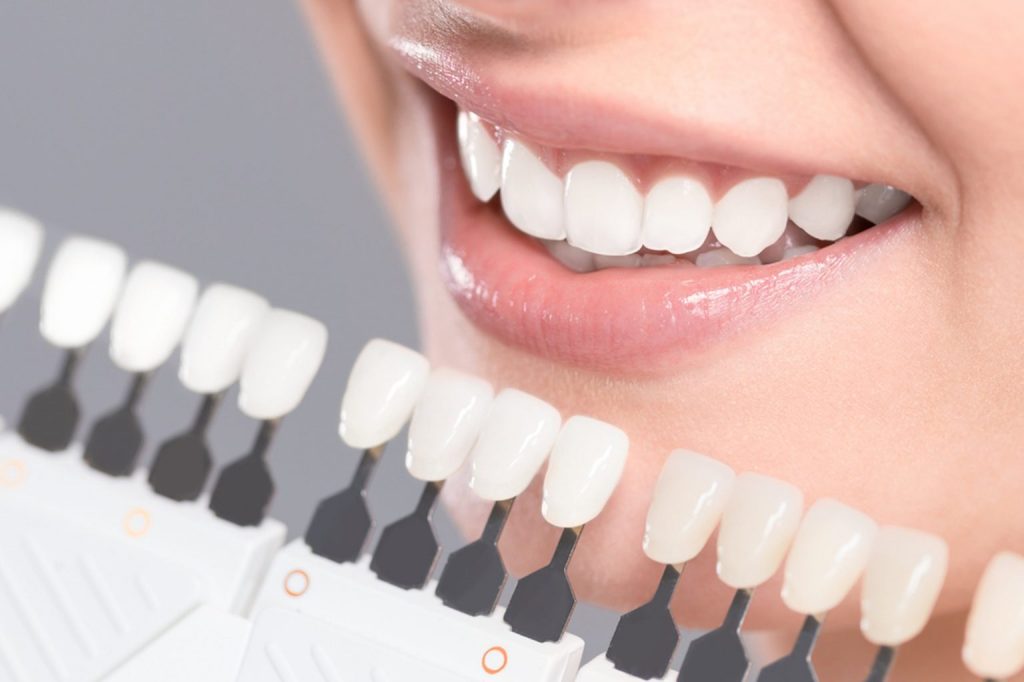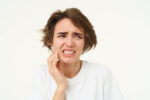
One of the newest health and beauty trends sweeping social media is activated charcoal. This odourless black powder has historically been used to treat overdoses but has made its way out of the emergency room and into the spotlight. You’ll find activated charcoal in every beauty product you can think of, from face masks to foot scrubs.
A newer trend is also emerging — using activated charcoal for teeth whitening purposes. Does activated charcoal work for teeth? And if it does, is it safe to use? We’ll answer these questions and more to give you a clearer understanding of this controversial product.
Table of Contents
What Is Activated Charcoal and How Does It Work?
If you don’t keep up with the hottest new trends, you may think of charcoal as those little briquettes you grill with. While that form of charcoal is generally made from sawdust and coal dust, activated charcoal is usually composed of a variety of substances. Think natural materials like peat, wood, coconut shells and even olive pits. These materials undergo a controlled decomposition.
The fine-grained powder is “activated” by extreme heat, causing oxidization. The benefits of activated charcoal come from the fact that it’s adsorbent, which allows it to soak up things like odours and toxins.
Activated charcoal’s absorbency allows it to snag and trap chemicals within its extremely porous structure. This occurs due to the negative electric charge on the surface of the charcoal, which attracts positively charged chemicals and gases. The adhesion prevents the trapped chemicals from entering the bloodstream.
What Is Activated Charcoal Used For?
The accepted medical use of activated charcoal is in treating certain types of poisoning. Ingested poisons make their way through the stomach lining into the bloodstream and bodily tissues. Consuming an activated charcoal product causes some or all of the ingested toxin to bind to the charcoal’s surface and exit the body through the digestive system without causing damage.
Corrosive poisons like lye, strong acids, petroleum or alcohol don’t bind to activated charcoal, so it won’t stop them from absorbing into the body.
Activated charcoal is also known as activated carbon and is used as a way to filter air and water thanks to its ability to remove odours and taste. The difference in terminology is primarily due to the marketing strategy. Charcoal is often associated with things and activities that are messy or dirty, and that doesn’t work well as a title for products that are purifying air or water. You can find activated charcoal in everything from vacuum bags to air purifiers and the water filter in your water pitcher.
Health Claims About Activated Charcoal
Health-conscious individuals are always looking for ways to improve the way their bodies function. At some point, someone seized upon the idea that because activated charcoal binds to toxins, it can “detoxify” various parts of the body, leading to better health overall and possibly “curing” people of certain ailments. Here are five of the more popular activated charcoal uses and a look at whether they have any basis in fact.
1. Skin Scrub
Body washes and skin scrubs containing activated charcoal are a dime a dozen. The idea is that the charcoal will attach to all the hidden dirt and grime, allowing you to wash it away with greater ease. Work in the European Journal of Pharmaceutical and Medical Research (EJPMR) does confirm that activated charcoal can draw bacteria, chemicals, dirt and other tiny particles from deeper parts of the skin up toward the surface, so these claims may have some validity.
2. Cholesterol Reduction
It’s thought that activated charcoal can bind to cholesterol as well as some of the acids in the gut which contain cholesterol. Two studies, which were conducted in the 1980s, support this idea. One study had patients take 8 grams of activated charcoal thrice daily for four weeks. These patients showed a 25 percent decrease in total cholesterol.
The other study saw patients take 4 to 32 grams of charcoal daily. By the end of the study, total cholesterol was down 29 percent. It’s crucial to remember that due to the small sample size of both experiments, as well as their age, we still need more research to determine whether activated charcoal truly reduces cholesterol.
3. Gas Reduction
Bloating and excess gas in the gut is not a comfortable condition to contend with, and there is some evidence that activated charcoal can help reduce this. A study conducted in 2012 had people with a history of excess gas take just under 5 grams of activated charcoal three times a day for two days. About 34 percent of the people participating reported that their symptoms improved.
Notably, the European Food Safety Authority (EFSA) concluded in 2011 that there is enough evidence to lend validity to the use of activated charcoal for reducing excess gas.
4. Deodorant
Another cosmetic use for activated charcoal is in deodorants. There is currently no evidence for or against charcoal as an ingredient in deodorant, but based on what we know about its mechanisms, it’s reasonable to believe there is some benefit. Activated charcoal is known to absorb smells and excess moisture, both hallmarks of a functional deodorant. In most cases, all you have to worry about with these types of deodorant is staining your underarm skin.
5. Overall “Detox”
While health claims about using charcoal on the skin and for specific internal uses have some validity, the idea that it can be used as a “detox” aid is unfounded and potentially dangerous. Social media influencers have created a vision of “detox” as removing toxins from the blood and body, allowing them to market certain products more effectively. In reality, your liver is responsible for doing this detox job, and when it’s healthy, it does so quite efficiently.
Even if your liver were damaged or otherwise not functioning correctly, activated charcoal has no full-body detox power because it doesn’t enter the bloodstream. Ingested charcoal works only within the stomach and digestive tract, which is why it may be useful in reducing gas and cholesterol, but it simply cannot do anything to filter or detoxify the bloodstream.
In fact, ingesting activated charcoal can be dangerous in some situations. Most notably, it can stop certain drugs from being absorbed into the bloodstream. This effect isn’t a huge problem when you’re taking a few aspirins, but it can cause unpredictable effects when the charcoal is binding to medications like tricyclic antidepressants or birth control pills. There is also some concern that charcoal may bind to some vitamins and minerals essential to nutrition, making them unavailable to the body.
Activated Charcoal and Teeth Whitening
While activated charcoal mostly filled food and facial scrubs for a while, someone eventually realized they could also put it in oral health products and market it as a tooth whitener. Does activated charcoal work for teeth? Anecdotal evidence abounds that charcoal can lead directly to strong, white and healthy teeth. In fact, at least one “teeth whitening” charcoal product has more than 20,000 reviews from mostly satisfied customers. Aside from the potentially significant issue of fake reviews, the science simply disagrees.
The Canadian Dental Association has also elected not to approve any activated charcoal products for use in dentistry.
Many activated charcoal products come in a pure powder or charcoal tablets which you dip a wet toothbrush into and then proceed to brush as you normally would. Some products incorporate the powder into a product that looks and feels like regular toothpaste — aside from the distinctive black tint.
A lack of evidence has not stopped the proliferation of activated charcoal in dental products. People keep buying them because they feel the products work, but they often don’t weigh the benefits and risks of activated charcoal teeth whitening. Call our office for more information regarding best practices for teeth whitening.
Is Activated Charcoal Safe for Teeth Whitening?
Even if an activated charcoal product does successfully whiten your teeth to some degree, you need to be aware of the risks associated with these products. Charcoal is an abrasive material, which can pose a serious danger to your teeth. Your teeth don’t grow and can’t heal themselves from damage, so anything that scrubs away the enamel is a product to be avoided.
Some charcoal products are more abrasive than others. You can use the Relative Dentin Abrasivity (RDA) method to check activated charcoal products. The RDA measures how abrasive FDA-approved products are. A score of 200 or below is considered safe to use by the FDA. Even if your charcoal toothpaste product comes in under 200, you should still use it only in moderation. If it turns out to be more abrasive than stated due to the lack of regulation, you can permanently damage your teeth.
Professional Teeth Whitening as an Alternative
Before resorting to brushing your teeth with charcoal, ask your dentist about professional teeth whitening. In the hands of an experienced dentist, you can get whiter teeth than you would using activated charcoal toothpaste or even an over-the-counter whitening kit.
The in-office bleaching procedure usually takes between 60 and 90 minutes and may require multiple visits depending on the current state of your teeth as well as your desired shade. The procedure varies from dentist to dentist, but you can expect something similar to the following.
- The dentist will record the current state and shade of your teeth as a starting point, to measure the success of the procedure’s outcome afterward.
- Plaque on the surface of your teeth will be carefully removed with pumice or another abrasive material.
- The dentist will isolate your mouth with gauze to ensure your teeth stay dry and your oral tissue is not affected by exposure to the whitening solution.
- An additional barrier may be used to prevent the solution from coming into contact with your gums.
- The dentist will coat the front of your teeth with a whitening solution, which usually contains hydrogen peroxide or carbamide peroxide.
- Your whitening solution will likely require a laser or curing light to activate whichever peroxide is in your formula.
- After the solution has been applied and cured, it needs to stay in contact with your teeth for anywhere from 30 to 60 minutes before being rinsed.
You may find the treatment has not whitened your teeth to the extent you desire, in which case you would schedule additional visits. After the procedure, you will need to protect your newly whitened teeth by avoiding colourful foods and beverages, as well as acidic ones, for 24 hours or more. This may mean skipping your morning coffee and omitting the mustard on your sandwich at lunchtime. You should also avoid smoking for the best results.
The most common side effect of professional tooth whitening is irritation of the gums due to exposure to the whitening solution. Your teeth may also feel sensitive after the procedure, though this side effect usually dissipates with time. If tooth sensitivity is bothering you, your dentist may recommend a toothpaste or other product designed to reduce the unpleasant sensation.
Take-Home Teeth Whitening
Teeth bleaching is not always the most suitable option for whitening teeth. It tends to be a temporary solution and a more expensive one at that. For a more long-term solution, consider take-home teeth whitening. It can restore the natural colour of your teeth in the comfort of your own home, on your own schedule.
The dentist prepares customized teeth-whitening splints and provides you with the whitening agent. The splints can be ready in just a day or two, and you will need to wear them for three to four hours every day. You will see the stains bubbling out of your enamel, and you will likely be able to reach your desired shade in about two weeks or less. After that, your splints will be used only for occasional maintenance and spot treatments.
This form of teeth whitening lasts longer than bleaching and can correct issues where colouring is not uniform — such as when teeth are mottled.
Contact Gateway Dentistry Today
If you’re wondering how to whiten teeth, you should speak to a dentist to determine what options are most suitable for you. Activated charcoal products may have tooth-whitening properties, but there is simply too much we don’t know about them. What we do know is that many of these products can be quite abrasive, thereby causing teeth to weaken even as they begin to look whiter.
Gateway Dentistry Group’s teeth whitening services are suitable for a range of ages as well as a range of tooth colouring issues that bleaching can’t resolve effectively. At Gateway Dentistry Group, we understand that teeth whitening can be a healthy part of overall dental health. If you would like to learn more about our range of dental services or set an appointment, call us today at 1-780-539-3555 or contact us online.








